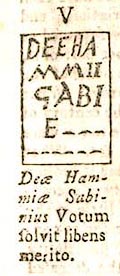





are found out of Italy. On this account, I would rather read Viator as a proper name, of which we have several instances in the same author. Nor is it altogether needless to observe, that, if we take it in this sense, we may easily suppose the rest of the line to have been filled up with some letters relating to his own, or his father's name, with F for Filius, or some such thing; whereas, were we to take Viator for the officer, we should be quite at a loss to guess what made up the rest of the line. These considerations have had so much weight with me, that I have ventured to put under the inscription the reading, to which, indeed, the lost spaces in each of the remaining lines are not unsuitable. The last line is very obscure, and confused. As to the first faint appearance of a letter in it, I do not know whether to consider it as one, or as an accidental scratch upon the stone. However, the whole might have been H.S.F.C. for Hoc sepulchrum faciendum curavit; as it is common enough in other inscriptions. The Cohors quarta Brittonum Antoninia was, perhaps, stationed at Magna before the writing of the Notitia.


V. This is a portable altar, the capital and base of which I did not take, as I saw nothing remarkable in them. The inscription is curious and well worth observing, if it be only for the sake of the word Hammia, which is not to be met with in any other. I at first thought it to have been the name of some local deity; but that the Syrian Goddess, or Mother of the Gods, is intended by it, I do not now at all question. For it seems plainly to be of Hebrew or Syriac, from םא Eem, or אםיא Aimma, Mater (n). And Hesychius gives us the same signification of both Αμμια and Αμμάς. The H, or aspiration, indeed, has been superadded. Mr Horsley has an inscription to the same goddess under the name of Dea Suria, which, he is inclined to believe, formerly belonged to Little Chesters (p). it is also mentioned in Cambden (q). Cybele, Rhea, Ceres, Tellus, Dea Syria, Dea mater, are all well known to have been names belonging to the same deity. The person, by whom this altar was dedicated, appears to have been one Sabinus, or Sabineius; but I prefer the latter name, which, tho' not so common as the other, we have in Gruter (r); for in the next line to SABT there seems ot have been a letter before the E; and there is room enough after it for three letters more. This conjecture, perhaps, may not be a little confirmed by observing that the solitary E could never have belonged to the word Fecit, because we never meet with this word upon altars, without Ex Voto, Ex Imperio, or some such thing preceeding it; and it is impossible that this should have been the case here. Very probably, there was originally added in another line, tho' now obliterated, the letters V.S.L.M. or some others, yt are commonly met with in inscriptions of the like kind. I take this altar to have been inscribed in the time of the decliine of the Roman power in Britain; for the letters are rudely cut, the stone is of very coarse grit, and DEE is used instead of Deae; all of which are marks of the low empire.
To the above observations it may not be amiss to subjoin the two following articles, tho' not of much importance.
At a well near Walton, not far from Carrvoran, I saw the under part of a broken altar. Mr Horsley has mentioned it (s); but it seems to have been unobserved by him, as having still remaining upon it very distinctly, the letters V.S.L.M. for Votum sobuit libens merito.
At the House Steeds, near the chief row of sculptures and inscriptions, there lies a thin flat stone, of an oblong figure. Thinking it might have something upon it, I raised it up, and examined it, and found upon one of its longest edges the letters MARII plainly cut, besides the obscure appearances of several others. I am apt to think it part of the centurial kind, and that it has been a part of the wall of the station. It seems not to have been taken notice of before.


 Gents Mag 1752 p.108
Gents Mag 1752 p.108